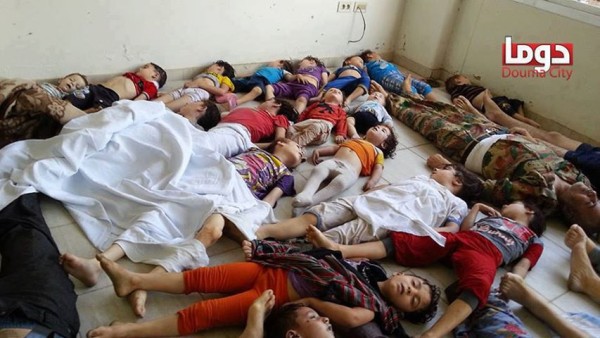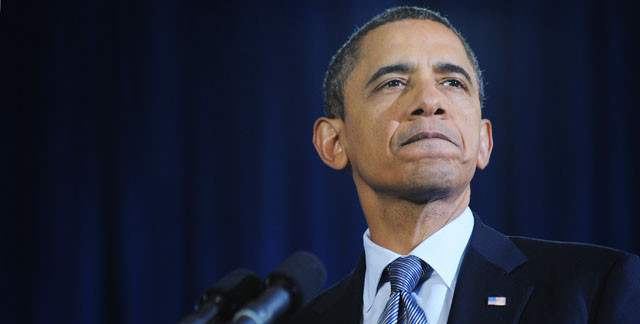Now see updated and modified version for The Conversation — Syria Special: Obama’s Legacy Will Be Forever Tarnished by His Inaction
This morning I saw the framed poster of Barack Obama on the wall of my son’s bedroom. The newly-inaugurated President is striding in a casual pose, his tie slightly undone, his left arm stretched upwards in a wave to an unseen audience.
The caption says “Destiny”.
I must admit that I had not noticed that poster for years.
—
Whatever their accomplishments, Presidents will usually have their legacies anchored to a single event. Lyndon Johnson will forever sink with the Vietnam War, Richard Nixon with Watergate, Jimmy Carter with the combination of the Ayatollah in Iran and the Soviets in Afghanistan. George W. Bush will always be branded with the Mission Un-Accomplished of the 2003 Iraq War. Conversely, Ronald Reagan, whose second term was mired in scandal (remember Iran-Contra?) will be perpetually rescued by the myth that He Won the Cold War.
Barack Obama can point to breakthroughs that were distant when he took office, from the nuclear agreement with Iran to diplomatic relations with Cuba after almost 60 years. He can declare stability with the concerted international action to stave off economic crisis, a more constructive US approach to Latin America, and a solid if cautious relationship with China. Shame that climate change seems to have disappeared from his speeches, let alone his agenda, but even here have been small advances and no more of Bush’s Damn the Treaties line.
But it is likely that none of these will hold attention beyond Obama’s Farewell Speech two months from now. Instead, his Destiny will be Syria.
Neither the President nor anyone else noticed Damascus when Obama declared, “We reject as false the choice between our safety and our ideals” on a snowy Washington day in January 2009: it was neighboring Iraq that was the lodestone of American failure. But eight years later — even as a battle is still being waged in Iraq but against the Islamic State rather than Saddam Hussein — it is the ghosts of more than 500,000 dead and the far-from-ghostly millions of displaced who walk across the Obama legacy.
The President who infamously reduced his policy to “Don’t Do Stupid Shit” apparently never considered that inaction could be far worse than stupid.

Victims of the Assad regime’s chemical weapons attacks near Damascus, August 2013
Retreating from Action
In August 2011 Barack Obama put away his Administration’s hope that President Bashar al-Assad would respond to protesters by meeting their demands for reform rather than beating, shouting, detaining, and torturing them.
We have consistently said that President Assad must lead a democratic transition or get out of the way. He has not led. For the sake of the Syrian people, the time has come for President Assad to step aside.
Assad was not swayed. Russian Foreign Minister Sergei Lavrov had said that 50,000 deaths were acceptable to maintain power, and had assented when the regime asked if 100,000 were permissible. With his Army reeling, the Syrian President turned to his warplanes. Homs, Syria’s third-largest city, was decimated for months by bombing, with thousands perishing and more fleeing, until the opposition capitulated in all but a few districts in spring 2012. The pattern of a scorched-earth war had been set out.
Obama did little. There were economic sanctions on Damascus, but Assad and his inner circle were propped up with billions from Iran and Russia. The CIA eventually set up training camps for some rebels, notably in Turkey, and got Eastern European arms to some others, but the process was cumbersome and far from significant.
Crucially, there were no anti-aircraft weapons to check Assad’s bombing and there were no protected areas. Secretary of State Hillary Clinton and CIA Director David Petraeus pressed for no-fly zones, but the President vetoed all proposals. Meanwhile, in stark comparison with the small number of rebels that made it through CIA vetting, Iran’s Revolutionary Guards began establishing a 50,000-strong militia to cover the weakness of the Syrian Army while Hezbollah put in several thousand of its own fighters.
Assad’s warplanes kept bombing. When they ran short of conventional munitions, they turned to barrel bombs, drums filled with explosive and dropped out of helicopters. When these were not enough, the Syrian military began experimenting with chemical weapons. It had tested “toxic gas” in sewers in northeast Damascus in late 2011. A year later, the chemicals showed up in Idlib and Homs Provinces, then in Aleppo Province in spring 2013.
And on August 21, 2013, the regime unleashed sarin nerve agent on multiple locations near Damascus. The conservative report from reliable outlets is that more than 1,400 people were killed. Many of them were first responders and medics who tried to treat the suffocating.
Obama did little. His top advisors — such as Secretary of State John Kerry, who was comparing Assad’s crimes to those of Hitler — were gathered for the decision to intervene, finally setting up protected areas and trying to ground the Syrian Air Force. But the President, after a stroll in the Rose Garden, returned to surprise them with a No. Instead, he would defer any decision and consult Congress.
A few days later, the President found an alternative. Russia, scrambling to save its troublesome ally, suggested that Assad could be pressed to give up his chemical stocks and equipment. Obama accepted, “With modest effort and risk, we can stop children from being gassed to death, and thereby make our own children safer over the long run.”
Damascus did give up almost all of the chemicals. But it retained all of the conventional weapons that had killed, conservatively, more than 100,000 civilians. And it could use chlorine, which is not banned by chemical weapons conventions, in its barrel bombs.
The course of Obama’s action, or inaction, had been set. The US would follow in its version of the political process. From the outset, that process was more myth than reality — Assad will never step down for a “transitional governing authority”, and the opposition and rebels will never accept Assad — but the Russians had bought time and Obama had bought an illusion which was preferred to “stupid shit”.
When pro-Assad forces imposed their “surrender or starve” sieges, the President stood aside. When Russia intervened with its bombers and military “advisors” in September 2015 to save Assad and his depleted military, Obama watched. As the Russians and regime targeted hospitals and clinics, destroying scores of them, as they hit schools, markets, fuel depots, and water and power facilities, he was passive.
The President could always invoke the “political process”. And, from September 2014, he could use the diversion of the War Against the Islamic State, who controlled parts of Syria in a war with rebels and with Kurdish forces.
Leaving the Disaster
The war grinds on and the civilian deaths mount. International attention was briefly galvanised by the Russian-regime attempt to bomb and besiege opposition areas of Aleppo, Syria’s largest city, into submission.
But the President’s legacy is probably safe. There are more than enough pundits in Washington — many of them Obama’s former officials who counselled against action — to wring hands about the danger of “extremists” rather than of Assad, about a Russian response, about the logistics of the task. Hillary Clinton, hoping to succeed Obama, had revived the ideas of protected areas and leverage against the Russians, rather than walking a step behind them; however, in a perverse twist, the President can now count on Donald Trump, who shouts that a protected zone will bring World War 3. And, of course, he can count on the Russians with a propaganda machine to match their political and military commitment to the Assad regime’s deadly rule.
So Moscow and the Assad regime brush aside any possibility of an effective check on their plans. Eastern Aleppo city is now starving and battered by the bombs killing scores of civilians each day. Other areas near Damascus and in northwest Syria are suffering the safe fate.
The Obama Administration’s response is to turn away. The easier options are to pursue the sideshow of the Islamic State, supporting a Kurdish-led force to push back the weakening ISIS, and to try and kill leaders of the jihadists of Jabhat Fatah al-Sham (formerly Jabhat al-Nusra).
At a summit in Peru on November 21, the President briefly met Russian counterpart Vladimir Putin and said he was deeply concerned by “constant bombing attacks”. Obama spoke of “chaos for quite some time”.
And that was it. There was no indication of any Presidential attempt to stop the assault on Syrian civilians as well as rebels, let alone opposition to the Assad regime and its allies.
Obama’s Pride
In the speech justifying his course of inaction after the August 2013 chemical attacks, Obama proclaimed:
Our ideals and principles, as well as our national security, are at stake in Syria, along with our leadership of a world where we seek to ensure that the worst weapons will never be used.
The “worst weapons” — bunker-buster bombs, incendiary munitions, thermobaric explosives, and occasionally chemical substances — are still being used. Hundreds of civilians, almost all of them killed by Russia and the Assad regime, are dying each week. Millions are unlikely to ever return home. Bashar al-Assad will remain in power over most of Syria, but he will be ruling over a wasteland.
But asked in early 2016 about the failure to intervene, even after those “worst weapons” were dropped near Damascus, the President responded:
I’m very proud of this moment.
Such is his Destiny.

